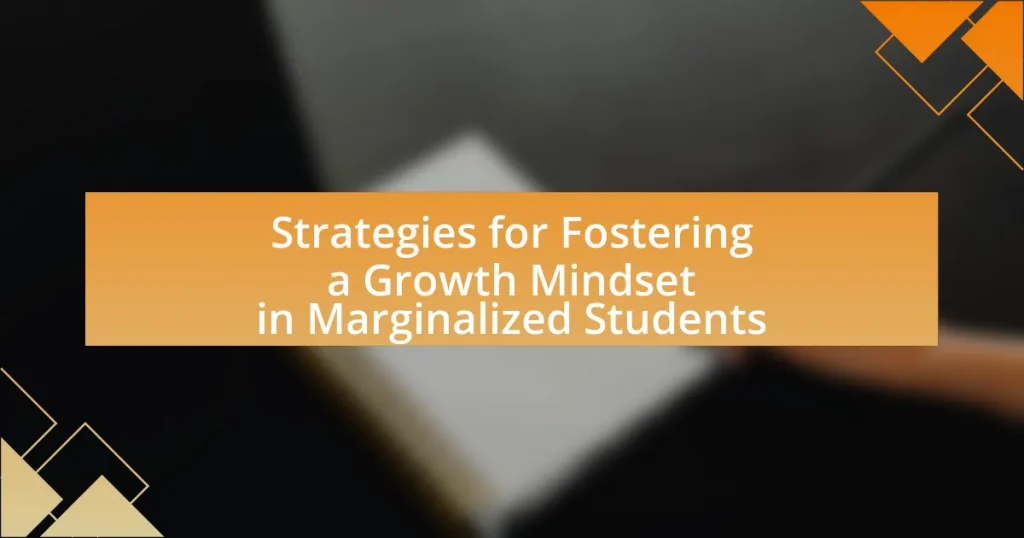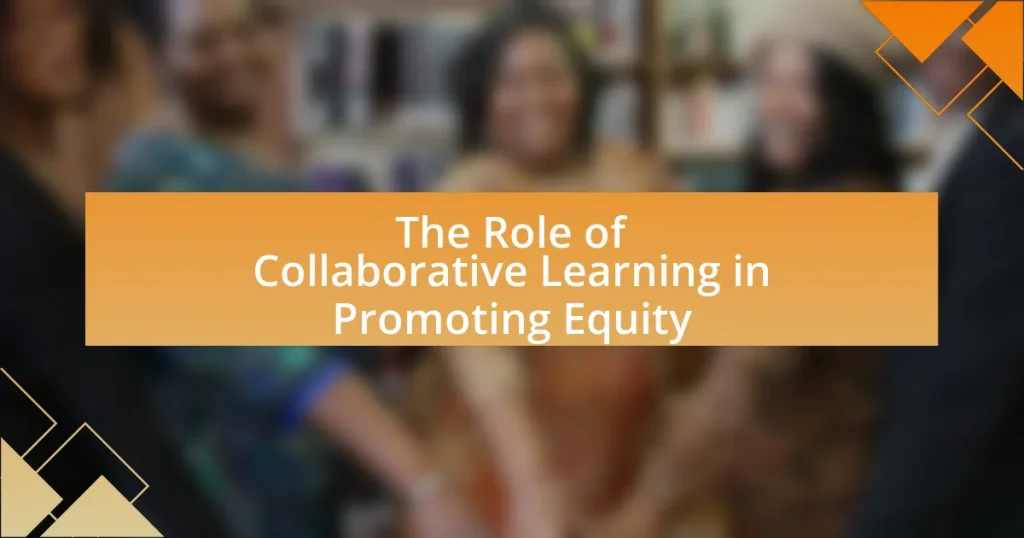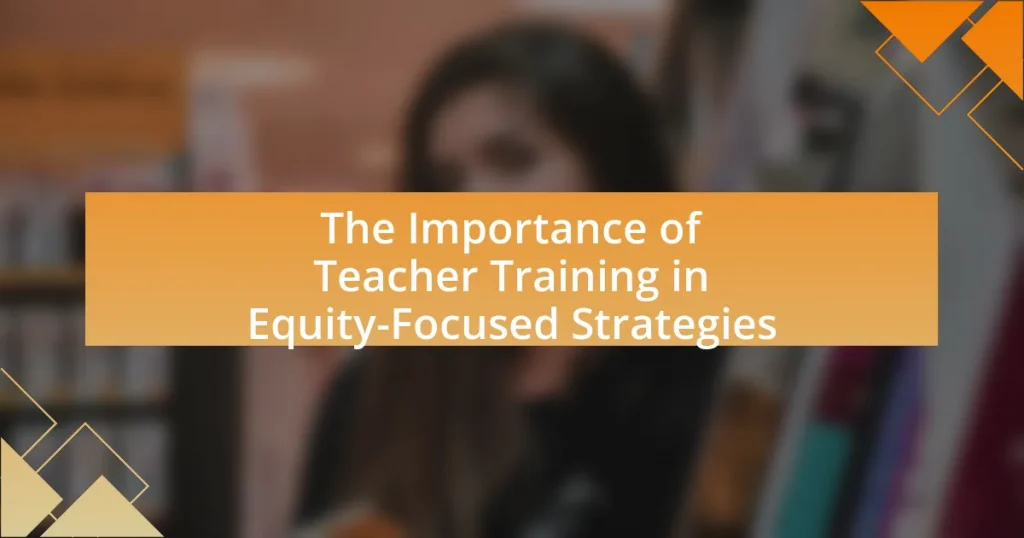The article focuses on strategies for fostering a growth mindset in marginalized students, emphasizing the importance of creating supportive learning environments, providing constructive feedback, and promoting resilience. Key practices include implementing culturally responsive teaching, differentiated instruction, and fostering collaboration among students. The article also explores the role of feedback in developing a growth mindset, the psychological barriers faced by marginalized students, and the significance of community and family involvement in enhancing educational outcomes. Additionally, it highlights effective mentorship programs and practical tips for educators to encourage resilience and a growth mindset among their students.
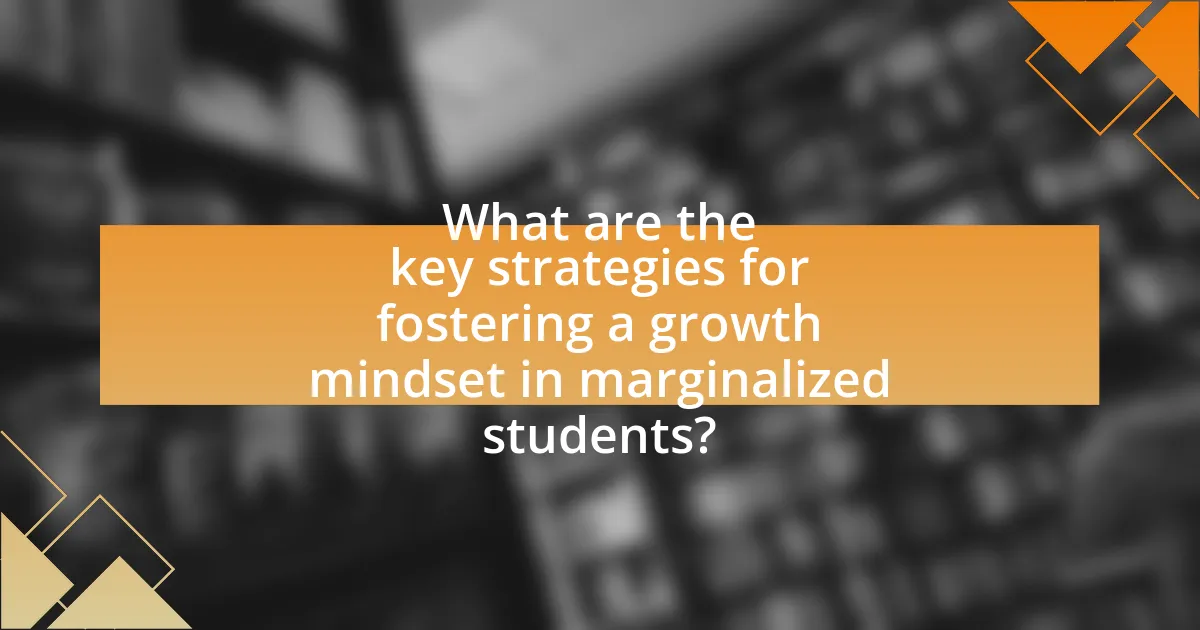
What are the key strategies for fostering a growth mindset in marginalized students?
Key strategies for fostering a growth mindset in marginalized students include creating a supportive learning environment, providing constructive feedback, and promoting resilience through challenges. A supportive learning environment encourages open communication and collaboration, which helps students feel safe to take risks. Constructive feedback focuses on effort and improvement rather than innate ability, reinforcing the idea that skills can be developed over time. Promoting resilience involves teaching students to view challenges as opportunities for growth, which can be supported by incorporating growth mindset language into everyday interactions. Research by Dweck (2006) highlights that students who adopt a growth mindset are more likely to embrace challenges and persist in the face of setbacks, leading to improved academic outcomes.
How can educators create an inclusive environment that promotes a growth mindset?
Educators can create an inclusive environment that promotes a growth mindset by implementing differentiated instruction and fostering a culture of collaboration. Differentiated instruction allows educators to tailor learning experiences to meet diverse student needs, ensuring that all students feel valued and capable of growth. Research indicates that when students perceive their learning environment as supportive and responsive to their individual strengths and challenges, they are more likely to adopt a growth mindset (Tomlinson, 2014). Additionally, fostering a culture of collaboration encourages peer support and shared learning experiences, which can enhance resilience and motivation among marginalized students. Studies show that collaborative learning environments lead to improved academic outcomes and increased self-efficacy, further reinforcing the principles of a growth mindset (Johnson & Johnson, 2009).
What specific practices can teachers implement to support marginalized students?
Teachers can implement culturally responsive teaching practices to support marginalized students. This approach involves recognizing and incorporating students’ cultural backgrounds into the curriculum, which enhances engagement and relevance. Research indicates that culturally responsive teaching can improve academic outcomes for marginalized students by fostering a sense of belonging and validation in the classroom. For instance, a study by Gay (2010) highlights that when teachers integrate students’ cultural references into their lessons, it leads to increased motivation and participation. Additionally, teachers can establish strong relationships with students by providing mentorship and support, which has been shown to positively impact students’ self-esteem and academic performance.
How does classroom culture influence students’ mindsets?
Classroom culture significantly influences students’ mindsets by shaping their beliefs about learning and intelligence. A positive classroom culture fosters an environment where mistakes are viewed as opportunities for growth, encouraging students to adopt a growth mindset. Research by Dweck (2006) indicates that students who perceive their classroom as supportive and collaborative are more likely to embrace challenges and persist in the face of difficulties. Conversely, a negative classroom culture can lead to fixed mindsets, where students believe their abilities are static and avoid risks. This dynamic illustrates how the values, norms, and interactions within a classroom directly impact students’ attitudes toward learning and their overall academic resilience.
What role does feedback play in developing a growth mindset?
Feedback is essential in developing a growth mindset as it provides individuals with specific information about their performance, guiding them toward improvement. Constructive feedback helps learners understand their strengths and areas for growth, reinforcing the belief that abilities can be developed through effort and learning. Research by Dweck (2006) indicates that feedback emphasizing effort and strategies fosters resilience and a willingness to embrace challenges, which are key components of a growth mindset. Thus, effective feedback not only informs but also motivates individuals to persist in their learning journey.
How can constructive feedback be tailored for marginalized students?
Constructive feedback can be tailored for marginalized students by ensuring it is culturally relevant, specific, and supportive. Culturally relevant feedback acknowledges the unique backgrounds and experiences of marginalized students, making it more relatable and impactful. Specific feedback focuses on particular aspects of a student’s work, providing clear guidance on how to improve, which is essential for fostering a growth mindset. Supportive feedback emphasizes the student’s strengths and potential, encouraging resilience and motivation. Research indicates that culturally responsive teaching practices, which include tailored feedback, can significantly enhance the academic performance and engagement of marginalized students (Gay, 2010).
What are the best practices for delivering feedback that encourages growth?
The best practices for delivering feedback that encourages growth include being specific, timely, and constructive. Specific feedback focuses on particular behaviors or outcomes rather than generalizations, which helps individuals understand exactly what they did well or need to improve. Timely feedback ensures that the information is relevant and can be acted upon immediately, reinforcing learning. Constructive feedback emphasizes strengths while also addressing areas for improvement, fostering a positive environment that motivates individuals to develop their skills. Research by Hattie and Timperley (2007) in “The Power of Feedback” highlights that effective feedback significantly enhances learning outcomes, particularly when it is clear, actionable, and supportive.
Why is resilience important for marginalized students in developing a growth mindset?
Resilience is crucial for marginalized students in developing a growth mindset because it enables them to overcome challenges and setbacks that are often exacerbated by their social and economic circumstances. Resilient students are more likely to view failures as opportunities for learning rather than as insurmountable obstacles. Research indicates that resilience can significantly enhance academic performance and emotional well-being, particularly in students facing adversity. For instance, a study published in the Journal of Educational Psychology found that resilient students demonstrated higher levels of motivation and engagement, which are essential components of a growth mindset. This ability to adapt and persist in the face of difficulties fosters a belief in their capacity to grow and improve, ultimately leading to greater success in their educational journeys.
How can resilience be fostered in students facing systemic challenges?
Resilience can be fostered in students facing systemic challenges through targeted support systems, such as mentorship programs and access to mental health resources. Research indicates that mentorship can significantly improve students’ coping strategies and academic performance, as evidenced by a study published in the Journal of Educational Psychology, which found that students with mentors reported higher resilience levels and better emotional regulation. Additionally, providing access to mental health resources helps students develop coping mechanisms to navigate systemic barriers, as highlighted by the American Psychological Association, which emphasizes the importance of mental health support in fostering resilience among marginalized youth.
What strategies can help students overcome setbacks and failures?
Students can overcome setbacks and failures by adopting a growth mindset, which emphasizes resilience and learning from experiences. This approach encourages students to view challenges as opportunities for growth rather than insurmountable obstacles. Research by Carol Dweck, a psychologist at Stanford University, highlights that students with a growth mindset are more likely to persist in the face of difficulties and achieve higher academic success. Additionally, implementing strategies such as setting specific, achievable goals, seeking feedback, and reflecting on past experiences can further support students in navigating setbacks effectively. These strategies foster a supportive learning environment that promotes perseverance and adaptability, essential traits for overcoming challenges.
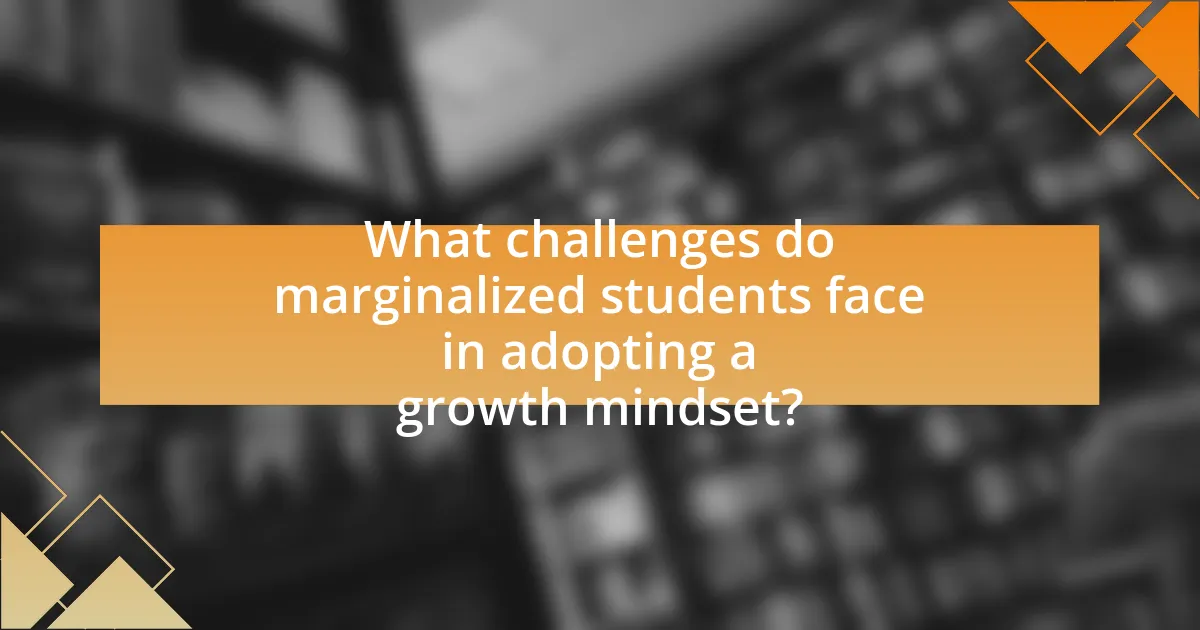
What challenges do marginalized students face in adopting a growth mindset?
Marginalized students face significant challenges in adopting a growth mindset, primarily due to systemic barriers such as socioeconomic status, lack of access to resources, and negative stereotypes. These factors can lead to feelings of inadequacy and a fixed mindset, where students believe their abilities are unchangeable. Research indicates that marginalized students often experience lower academic expectations from educators, which can reinforce a belief that effort will not lead to improvement. Additionally, the stress associated with their circumstances can hinder their ability to embrace challenges and learn from failures, further obstructing the development of a growth mindset.
How do societal factors impact the mindset of marginalized students?
Societal factors significantly impact the mindset of marginalized students by shaping their self-perception and academic aspirations. For instance, systemic inequalities, such as socioeconomic status and access to quality education, can lead to feelings of inferiority and reduced motivation among these students. Research indicates that marginalized students often face negative stereotypes, which can create a phenomenon known as stereotype threat, where the fear of confirming negative stereotypes hinders their performance and engagement in academic settings. Additionally, supportive community environments and positive role models can counteract these negative influences, fostering resilience and a growth mindset. Studies show that when marginalized students receive encouragement and resources, their academic outcomes improve, demonstrating the critical role societal factors play in shaping their mindset.
What external influences can hinder the development of a growth mindset?
External influences that can hinder the development of a growth mindset include negative feedback from educators, lack of supportive environments, and societal stereotypes. Negative feedback from educators can create a fixed mindset by emphasizing failure rather than learning opportunities, as shown in research by Dweck (2006), which highlights the impact of praise and criticism on student motivation. A lack of supportive environments, such as those that do not encourage risk-taking or resilience, can stifle the willingness to embrace challenges. Additionally, societal stereotypes, particularly those related to race or socioeconomic status, can lead marginalized students to internalize limiting beliefs about their abilities, further obstructing the development of a growth mindset.
How can educators address these societal challenges effectively?
Educators can address societal challenges effectively by implementing culturally responsive teaching practices that acknowledge and incorporate students’ diverse backgrounds. Research indicates that when educators adapt their teaching methods to reflect the cultural contexts of marginalized students, it enhances engagement and academic performance. For instance, a study by Ladson-Billings (1994) in “The Dreamkeepers: Successful Teachers of African American Children” demonstrates that culturally relevant pedagogy fosters a sense of belonging and motivation among students, leading to improved educational outcomes. By creating an inclusive environment that values diversity, educators can empower marginalized students to develop a growth mindset and overcome societal barriers.
What psychological barriers may prevent marginalized students from embracing a growth mindset?
Marginalized students may face psychological barriers such as fear of failure, low self-efficacy, and stereotype threat that prevent them from embracing a growth mindset. Fear of failure can lead to avoidance of challenges, as these students may associate failure with negative consequences, impacting their willingness to take risks in learning. Low self-efficacy, or the belief in their own abilities, can stem from past experiences of discrimination or underachievement, causing them to doubt their capacity for growth. Stereotype threat, the fear of confirming negative stereotypes about their social group, can create anxiety that hinders performance and reduces motivation to engage in learning opportunities. Research indicates that these barriers can significantly affect academic performance and personal development, making it crucial to address them in educational strategies.
How can educators help students overcome these psychological barriers?
Educators can help students overcome psychological barriers by implementing supportive teaching practices that promote resilience and a growth mindset. These practices include fostering a safe classroom environment, providing constructive feedback, and encouraging a focus on effort rather than innate ability. Research indicates that students who perceive their environment as supportive are more likely to engage in learning and persist through challenges (Dweck, 2006). Additionally, educators can incorporate social-emotional learning programs that teach coping strategies and self-regulation skills, which have been shown to improve students’ emotional well-being and academic performance (CASEL, 2020). By actively addressing these psychological barriers, educators can empower marginalized students to develop a positive self-concept and a belief in their ability to succeed.
What role does self-efficacy play in the mindset of marginalized students?
Self-efficacy significantly influences the mindset of marginalized students by enhancing their belief in their ability to succeed academically and socially. When marginalized students possess high self-efficacy, they are more likely to set challenging goals, persist in the face of difficulties, and ultimately achieve better educational outcomes. Research indicates that self-efficacy is linked to increased motivation and resilience, which are crucial for overcoming barriers often faced by marginalized groups. For instance, a study by Bandura (1997) highlights that students with strong self-efficacy beliefs are more likely to engage in proactive behaviors that lead to success, thereby reinforcing a growth mindset.
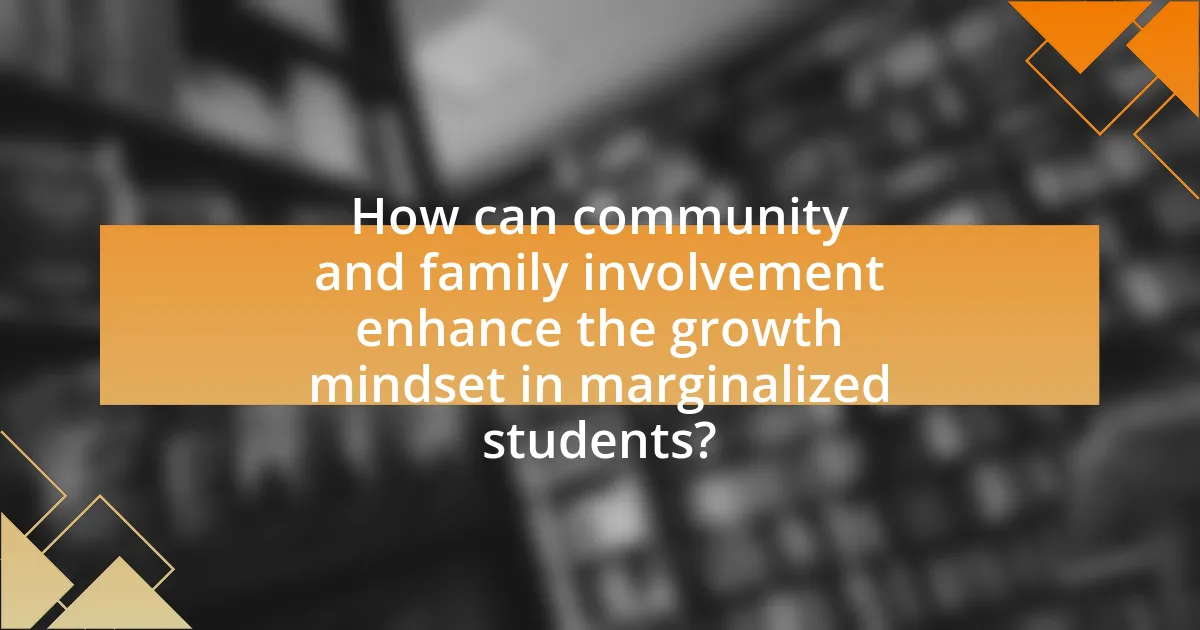
How can community and family involvement enhance the growth mindset in marginalized students?
Community and family involvement can significantly enhance the growth mindset in marginalized students by providing emotional support, resources, and positive reinforcement. When families actively participate in their children’s education, they create an environment that values learning and resilience, which is essential for developing a growth mindset. Research shows that students with supportive family and community networks are more likely to embrace challenges and persist in the face of setbacks. For instance, a study by the Harvard Family Research Project indicates that parental involvement is linked to improved academic performance and increased motivation among students. This involvement fosters a belief in the ability to grow and improve, which is central to the growth mindset concept.
What strategies can schools use to engage families in fostering a growth mindset?
Schools can engage families in fostering a growth mindset by implementing regular workshops that educate parents on the principles of growth mindset and its benefits for their children. These workshops can provide practical strategies for parents to reinforce growth mindset concepts at home, such as praising effort over innate ability and encouraging resilience in the face of challenges. Research by Dweck (2006) highlights that parental involvement in promoting a growth mindset significantly impacts children’s academic performance and self-esteem. Additionally, schools can create family engagement events that include activities demonstrating growth mindset principles, allowing families to experience and discuss these concepts together. This collaborative approach not only strengthens the home-school connection but also empowers families to support their children’s learning journeys effectively.
How can community resources support the development of a growth mindset?
Community resources can support the development of a growth mindset by providing access to mentorship, educational programs, and collaborative learning opportunities. Mentorship programs connect marginalized students with role models who exemplify resilience and perseverance, reinforcing the belief that abilities can be developed through effort. Educational programs, such as workshops and after-school activities, offer skill-building experiences that encourage students to embrace challenges and learn from failures. Collaborative learning opportunities, facilitated by community organizations, promote teamwork and peer support, fostering an environment where students can share strategies and celebrate progress. Research indicates that such community engagement significantly enhances students’ motivation and academic performance, contributing to a stronger growth mindset.
What partnerships can be formed to enhance student support?
Partnerships with local businesses, community organizations, and mental health services can be formed to enhance student support. Local businesses can provide internships and job shadowing opportunities, fostering real-world skills and confidence in marginalized students. Community organizations often offer mentorship programs and resources tailored to specific needs, which can help students navigate challenges. Collaborating with mental health services ensures access to counseling and emotional support, addressing psychological barriers to learning. These partnerships create a comprehensive support network that empowers marginalized students to develop a growth mindset and succeed academically.
How can mentorship programs contribute to a growth mindset?
Mentorship programs can significantly contribute to a growth mindset by providing personalized guidance and support that encourages resilience and adaptability. These programs facilitate constructive feedback and foster a safe environment for learning from failures, which are essential components of a growth mindset. Research indicates that mentorship can enhance self-efficacy and motivation, particularly among marginalized students, by connecting them with role models who exemplify perseverance and continuous learning. For instance, a study published in the Journal of Educational Psychology found that students who participated in mentorship programs demonstrated improved academic performance and a greater willingness to embrace challenges, reinforcing the idea that abilities can be developed through effort and learning.
What are the characteristics of effective mentorship for marginalized students?
Effective mentorship for marginalized students is characterized by cultural competence, emotional support, and goal-oriented guidance. Cultural competence ensures that mentors understand and respect the diverse backgrounds of their mentees, which fosters trust and open communication. Emotional support involves providing encouragement and validation, helping students navigate challenges related to their marginalized identities. Goal-oriented guidance focuses on setting achievable objectives and providing resources to help students reach their aspirations. Research indicates that mentorship programs that incorporate these characteristics significantly improve academic outcomes and self-efficacy among marginalized students, as evidenced by studies showing increased graduation rates and higher levels of engagement in educational activities.
How can mentors encourage resilience and a growth mindset?
Mentors can encourage resilience and a growth mindset by modeling positive attitudes towards challenges and failures. By demonstrating how to view setbacks as learning opportunities, mentors help students understand that effort and persistence lead to improvement. Research indicates that students who receive constructive feedback and encouragement from mentors are more likely to develop a growth mindset, as shown in studies by Dweck (2006) which highlight the importance of praise for effort rather than innate ability. Additionally, mentors can facilitate goal-setting and reflection, allowing students to track their progress and recognize their growth over time, further reinforcing resilience and a growth mindset.
What practical tips can educators implement to foster a growth mindset in marginalized students?
Educators can foster a growth mindset in marginalized students by implementing specific strategies such as promoting a culture of effort, providing constructive feedback, and modeling resilience. Promoting a culture of effort involves recognizing and celebrating students’ hard work and persistence rather than solely focusing on outcomes, which encourages them to embrace challenges. Providing constructive feedback helps students understand that mistakes are part of the learning process, reinforcing the idea that abilities can be developed through dedication and effort. Additionally, modeling resilience by sharing personal experiences of overcoming obstacles can inspire students to adopt a similar mindset. Research indicates that these practices can significantly enhance students’ motivation and academic performance, particularly in marginalized populations, as they help build confidence and a sense of belonging in the learning environment.
